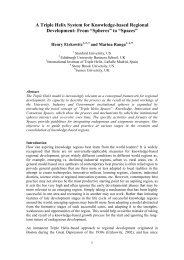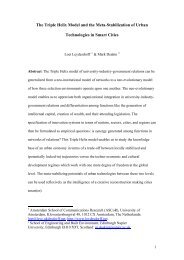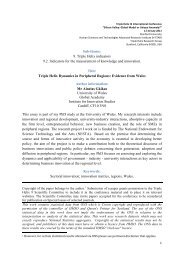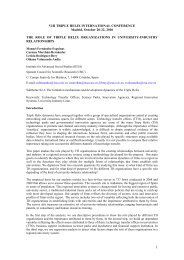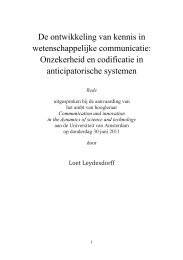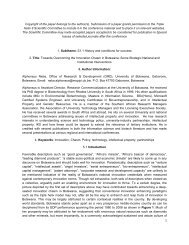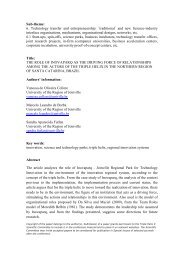TRIPLE HELIX noms.pmd
TRIPLE HELIX noms.pmd
TRIPLE HELIX noms.pmd
Create successful ePaper yourself
Turn your PDF publications into a flip-book with our unique Google optimized e-Paper software.
O-101HOW MUCH THE ROLE OF THE OTHER? UNIVERSITIES AS POLICY-MAKERS IN THEENTERPRISE INNOVATION ARENAArturo Vega, Lancaster University Management School, United KingdomIntroductionThe triple helix model considers the university-industry-government relationships as one of relatively equal and interdependentinstitutional spheres, which can overlap and take the roles of the others (e.g. Etzkowitz 2008 and 2002). In this research, weillustrate the case of universities taking the role of governments in the area of enterprise innovation. We argue that universitiesshould play the role of implementing policies and use discretion to some extent according to the programmes' scope of action,which was contractually agreed with the policy administrators. However, in 5 of the 6 case studies of this research we foundexcessive discretion and the consequent change of the role of the university personnel from policy-implementers to policymakers.Importantly, our assessment of the public interventions was very negative, which highlights the relevance of the research.We explain the reasons for the excessive discretion.State of the Art about the TopicTo my knowledge, there is no research about universities taking the role of governments. In contrast, in the areas of publicadministration and political sciences, there is a long-standing debate between two positions regarding discretion and the effectof this on policy-making. Firstly, we have the view from those who argue that discretion exists at street-level (e.g. Lipsky 1980,Lindblom and Woodhouse 1993, Ellis et al. 1999, and Maynard-Moody and Musheno 2003). In this situation, policies tend to bemade as much from the street-level by policy implementers, as from the heads of policy agencies. The second positionregarding discretion is from those who propose that there has been a shift in power in favour of policy-makers as result ofimproved and effective policies and procedures (e.g. Howe 1991, Clarke and Newman 1997 and Langan 2000).Research Focus and MethodologyWe developed 6 case studies of public programme assistance to e-business innovation initiatives in small and medium enterprises(SMEs), in order to uncover and illustrate the existence of discretion at programme level. After that, we analysed the context ofthe cases in terms of the complex procedures and behaviours in the policy process, which are determinant for the practice ofdiscretion at street level. The policy process includes policy-making (European Union Directorates-General and a regionalpartnership), policy administration (the Regional Development Agency and a University Association), and programmeimplementation (specialised units within a University).FindingsPolicy-makers are pressured to show the delivery of a high quantity of services but being very efficient in the use of resources,which diverted the auditing and control indicators and procedures to address these political imperatives, and not the quality andtargeting of the services. In addition, the policy administrators that performed the auditing and control activities are merecontract managers, who do not know about technology and business. What is more, their organisations took relevant roles indesigning the public policies or had connection to the organisations that delivered the programmes, which creates a conflict ofinterests. Another relevant finding is that policy-makers used extensive and ambiguous policies, probably as a strategy todistance themselves from the consequences of the particular and complicated decisions to balance the demand of services,SME needs and programme resources. Accordingly, if we take into account that programme managers could write broadproposals in order to access public funds, the breadth of the policy definitions can be exploited by them to formalise thediscretion of their consultants in each intervention. The data also shows that there is the risk that programme workers andauditors could misinterpret the numerous and vague phrases of the policies, which probably allowed public interventions to strayeven from broad policy statements.Contributions and ImplicationsThis research uncovered the duality of roles at street-level in the enterprise innovation policy arena. Although discretion isnecessary, we consider excessive the discretion exerted by the University personnel in the case studies. Policy implementerstook the role of policy makers as a result of political interests at the highest levels of government, inappropriate evaluationmechanisms, lack of knowledge and intriguing collaboration of the policy administrators, as well as broad and ambiguouspolicies. These findings represent relevant and novel contributions for the triple helix model. In general, the issue of discretionwas not researched before in the context of innovation policy. The origin of discretion seems to be rooted in the politicaldecisions taken at the highest levels of government. For this reason, we recommend to study policy-making for SME innovationusing the political economy framework. In addition, given the deficient support and excessive discretion in programmes, weconclude highlighting the need to research the entire context that direct programme workers towards objectives that are far fromsociety goals (e.g. power over SMEs, demand for programme services, worker alienation, etc.).Madrid, October 20, 21 & 22 - 2010345



